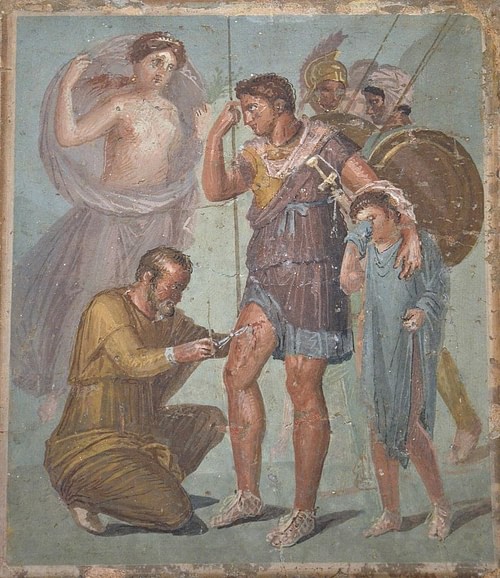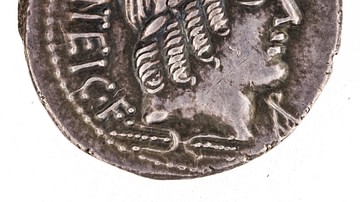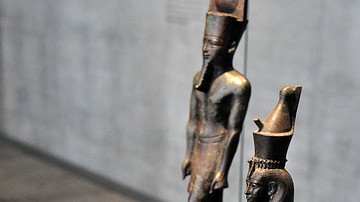
The ancient Romans had a rich mythology and, while much of it was derived from their neighbors and predecessors, the Greeks, it still defined the rich history of the Roman people as they eventually grew into an empire. Roman writers such as Ovid and Virgil documented and extended the mythological heritage of the ancient Mediterranean to gives us such long-lasting and iconic figures as Aeneas, Vesta, Janus, and the twin founders of Rome itself, Romulus and Remus.
The purpose of Myths
Before one can delve into a study of mythology, one must understand the concept behind a myth. In his book The Greek and Roman Myths: A Guide to the Classical Stories, Philip Matyszak describes a myth simply as “the ancient's view of the world.” These myths — although often appearing as simple stories filled with valiant heroes, maidens in distress, and a host of all-powerful gods — are much more. The gods of the Greeks and Romans were anthropomorphic, exhibiting many human qualities such as love, hate, and jealousy, and because of this, the people of Rome and Greece were able to see themselves in these tales and understand their relationship to the rest of the world as well their connection to the gods. The lesson often to be learned was that one must meet one's destiny with strength, determination, and nobility. These myths enabled an individual to stand against the ills and hardships of an unforgiving universe. Matyszak states that, in spite of their constant disagreements and battles, the gods and humankind had to stand together against the “monsters and giants” of the world, or more simply, the “forces of disorder and wanton destruction.”
Myths, whether Greek, Roman, any other culture's, at the end of the day were concerned with the relationship between the gods and humans, differing in this regard from fairytales and folktales. For all people, in many ways, myths made life bearable by providing security. They should not be easily dismissed as simple stories for, in both Greece and Rome, they dealt with important issues: the creation of the world, the nature of good and evil, and even the afterlife. And, for this reason, these tales have stood the test of time and become part of our present day culture. One only needs look at the names of our planets to see this: Mercury, Venus, Mars, Jupiter, Saturn, Neptune, Uranus and even poor little Pluto are all named for Roman gods.
Greek origins
In Greece, myths were derived from a rich old oral tradition: Homer's Iliad and Odyssey and Hesiod's Theogony. These were tales that had been passed down through the generations, first through the spoken word, and finally written down c. 8th century BCE. When Rome was founded in the 8th century BCE, many of the Greek city-states were already well-established. Greece even had founded colonies on the Italian peninsula and Sicily. Centuries later, after the four Macedonian Wars, these colonies would become a part of the early Roman Republic. This contact with Greece, and more specifically with Greek religion and mythology, had a lasting effect on Rome and its people. Rome was able to adopt much that defined Greece: art, philosophy, literature, and drama. Mythology, however, had to be adapted to reflect a Roman set of values.
The influence of Greek myths was seen everywhere in Rome; in the architecture, subject matter, and adornments of sculptures, temples, and mosaics. This adoption of all that was Greek can be seen in the city's relationship to the Trojan War, a war that ultimately led to the most basic of Roman mythology: the birth of Romulus and Remus and the founding of a city. Whereas much of Greek mythology was transmitted through their poetry and drama, the Roman myths were written in prose, providing a sense of history and a foundation of all that was Roman: their rituals and institutions. In Roman mythology the difference between history and myth was almost indistinguishable: Rome was a city of destiny and the myths told that story.
Ovid
Many early Roman authors wrote on the myths of Rome. Ovid, before his exile by Emperor Augustus, wrote at a critical time in Roman history, politically and culturally. The emperor was hoping to reestablish a connection to the Republic's old religion and a reverence for the gods. Ovid penned several works centering on both Roman myth and religion — Metamorphoses and Fasti are two of his best-known works. His stories, while mostly Greek, contained Roman names. In Fasti he portrayed the festivals of the first six months of the old Roman calendar, the legends of the gods, and the origin of many of their rituals. While early Roman mythology maintained a deep connection with the city and its rich history, it centered on one specific legend: the birth of its supposed founders: Romulus and Remus.
The Aeneid & Aeneas
While the true origin of Rome varies from source to source, historical as well as fictional, one of the earliest to relate the story (reminiscent of Homer's Odyssey) was Virgil (Vergil) in his Aeneid, a tale that related the travels of its hero, the Trojan warrior Aeneas. The Aeneid has been said to exhibit the most complete expression of Roman mythology. In the story, our hero, with the assistance of his mother, the goddess Venus (his father was a mortal named Anchises), escaped Troy with his father and a number of his fellow soldiers before the city completely succumbed to the Greeks. This story and its connection to the Trojan War gave the Romans a link to the ancient Trojan culture. It should be noted that the story of the Trojan horse comes from Virgil, though mentioned in Homer's Odyssey. With Venus's assistance, the defeated Trojans leave the fallen city and set sail for Italy, where it has been foretold that Aeneas would found a city. They traveled first to Greece and then, as in Homer's tale, are blown off course. Jupiter's wife Juno constantly interferes with Aeneas throughout the story. They land at the African city of Carthage where our hero meets the beautiful Queen Dido, and of course, love follows, and he soon forgets his true purpose.
Ultimately, the god Mercury intervenes and reminds Aeneas of his destiny, causing him and his men to reluctantly leave Africa and sail away; tragically, Queen Dido commits suicide over the loss of her beloved by throwing herself on a burning pyre. Upon landing at Cumae, Aeneas consults Sibyl, an oracle, who leads him into Hades where he not only encounters his fallen enemies and Queen Dido but also meets his recently deceased father who tells him of the great city his descendants would establish. Later, after reaching the mouth of the Tiber, the wayward Trojans enter into a war with King Turnus of the Rutuli (more of Juno's handiwork). Venus appeals to Vulcan (the Roman version of the Greek Hephaestus) to make Aeneas new armor and weapons as he had done for Achilles. Turnus was finally defeated and killed in a duel. A peace is ultimately reached with Aeneas marrying the king's daughter; supposedly Jupiter had convinced Juno to end her war with Aeneas.
Romulus & Remus
Aeneas's descendants became the founders of the city of his destiny: Rome. According to the legend, Romulus and Remus were the sons of the war god Mars and Rhea Silvia, daughter of the true king of Alba Longa, Numitor. In a coup, Amulius overthrew his brother and, to safeguard his claim to the throne, forced Rhea to join the Vestal Virgins. One day, Mars spied the young Rhea in the sacred woods and raped her. She bore two sons who, by order of King Amulius, were thrown in the Tiber. A recent flood caused them to drift ashore at Ficus Ruminalis. They were rescued by a she-wolf, the sacred animal of Mars (the wolf was supposedly aided by a woodpecker, another sacred animal of Mars). Later, the boys were adopted by a local herdsman named Faustulus and his wife Acca Larentia.
Years pass and the two future founders of the city become leaders in their community, with Remus ultimately landing in the king's dungeon. Romulus rescued his brother, and with the assistance of Numitor, deposed Amulius. Of course, by this time the boys had learned of their true identity. Together they founded a city; however, in a dispute over the naming rights to the city, Remus is killed in a fit of jealousy, and the city becomes Rome. In one version of the dispute, the boys agreed to watch for omens in a flight of birds. Romulus won the naming rights and Remus was killed (Romulus was supposedly favored by the gods). Romulus would rule Rome for forty years.
Roman Gods & Goddesses
Roman mythology, like that of the Greeks, contained a number of gods and goddesses, and because of the early influence of Greece on the Italian peninsula and the ever-present contact with Greek culture, the Romans adopted not only their stories but also many of their gods, renaming a number of them. One exception to this practice is the god Apollo, the only god whose name is common to both cultures. Originally, before their association with the Greeks, many of the Roman gods were more closely associated with cults rather than myths (as was the case with the Greek hero Heracles who became the Roman champion Hercules). Much of this change came, however, when the Romans turned from farming to war.
Early in the development of Roman mythology, there was Saturn, equivalent to the Greek god Cronus. His temple at the foot of Capitoline Hill included the public treasury and decrees of the Roman Senate. The triad of early Roman cult deities were recreated as Jupiter, Juno, and Minerva; the latter was the patron saint of craftsmen and goddess of school children (later associated with Athena). Jupiter, the sky-god, became more akin to the Greek Zeus. Jupiter influenced every aspect of a Roman's life; his temple on Capitoline Hill was the final destination of many victorious military commanders who would leave a portion of their booty as an offering to Jupiter. His wife (and sister) Juno became reminiscent of Hera, presiding over every facet of Roman women's life, and in the case of Aeneas, vindictive against those she disliked.
Similarly, the love-goddess Aphrodite became Venus, born from the foams of the sea, while the brothers of Zeus, Hades and Poseidon, became Pluto and Neptune respectively. The Greek Artemis was renamed Diana, the goddess of the hunt, while Ares, the war god, was now Mars who originally had been an agricultural god associated with spring, a time of regeneration (March is named for him). Roman commanders would always make a sacrifice to him before a battle. And lastly, one must not forget Hermes, the messenger, who turned into Mercury, a minor deity who had at one time been the god of trading and profit and, as mentioned, Hercules, the Roman version of Heracles.
As in Greece, Roman cities often adopted their own patron deity and built temples and performed rituals to honor that god. And, while the influence of the Greeks is vast, the Romans had a number of original gods of their own such as Janus, the two-faced god of doorways and gates (the city gates were open during the time of war and closed during the time of peace). Similar to the Etruscan god Culsans, Janus could see both the future and the past. Valued for his wisdom, he presided over the beginnings of all events. There was also Vesta, daughter of Saturn and the goddess of the hearth and family life, whose followers were called the Vestal Virgins. Though linked to the goddess Hestia of the Greeks, she took on her own distinct personality in Roman mythology. Numa, the second king of Rome, founded a cult dedicated to Vesta. Lastly, there was Faunus, the god of nature; he was worshipped as the protector of crops with a festival in December.
There were also a number of water gods, vitally important to the farmers, as every river and spring had its own deity (Juturna was the goddess of springs and water). Farmers had to appease these gods through a series of offerings. Tiberius was the god of the Tiber, and every May 27th straw dummies were thrown into the Tiber to pacify him. This is reminiscent of the ancient Roman belief in spirits —- supernatural forces that inhabited everything around them including people. Every May (9, 11, and 13) the festival of Lemuria was celebrated where the spirits of the dead were exorcized. Many Romans believed they were constantly watched over by the spirits of their ancestors.
While many people only think of the Greeks when the topic of mythology is considered, the Romans had a rich and vibrant mythology of their own. We all have heard, in some form, the story of the she-wolf and her saving the brothers Romulus and Remus and, in this same way, many other Roman myths have become a part of our culture in the present day. To the Greeks and the Romans, myths explained who they were as a people and gave them a sense of national pride, an understanding of valor and honor, and insight into their destiny.











